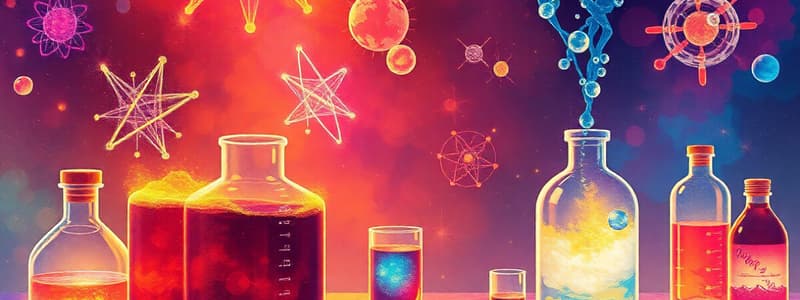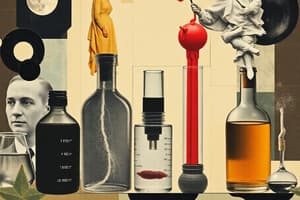Podcast
Questions and Answers
What is the primary purpose of experimental design?
What is the primary purpose of experimental design?
- To manipulate dependent variables without controls
- To form a conclusion based on experiments (correct)
- To create hypotheses with minimal evidence
- To measure the accuracy of previous theories
Why is it important for an experiment to be both accurate and precise?
Why is it important for an experiment to be both accurate and precise?
- To minimize variations in data interpretation (correct)
- To validate the effectiveness of unrelated theories
- To ensure results cannot be repeated
- To collect data that aligns with hypothetical models
What is the difference between a scientific theory and a scientific law?
What is the difference between a scientific theory and a scientific law?
- A law is flexible while a theory is fixed in nature
- A law is a pattern established by an equation; a theory explains the reason behind it (correct)
- A theory can be proven true; a law cannot
- A law describes why phenomena occur; a theory is an observation
Which of the following steps is NOT part of a well-structured experimental design?
Which of the following steps is NOT part of a well-structured experimental design?
What role does the scientific method play in experimental design?
What role does the scientific method play in experimental design?
What happens to scientific theories and laws as a result of repeated experiments?
What happens to scientific theories and laws as a result of repeated experiments?
What must an experimenter do to minimize outside interference in their experiment?
What must an experimenter do to minimize outside interference in their experiment?
Which characteristic defines accurate measurements in an experiment?
Which characteristic defines accurate measurements in an experiment?
What is the role of the independent variable in an experiment?
What is the role of the independent variable in an experiment?
What distinguishes the treatment group from the control group in an experiment?
What distinguishes the treatment group from the control group in an experiment?
Why is it important to accurately measure the dependent variable in an experiment?
Why is it important to accurately measure the dependent variable in an experiment?
What does random selection in an experiment ensure?
What does random selection in an experiment ensure?
How is a hypothesis typically formulated?
How is a hypothesis typically formulated?
What is the main purpose of analyzing collected data in an experiment?
What is the main purpose of analyzing collected data in an experiment?
In the example of plants exposed to different colors of light, what is the dependent variable?
In the example of plants exposed to different colors of light, what is the dependent variable?
Flashcards
Hypothesis
Hypothesis
A testable idea or prediction about the outcome of an experiment.
Independent Variable
Independent Variable
The part of an experiment that changes or is manipulated by the experimenter.
Dependent variable
Dependent variable
The part of an experiment that is measured or observed. It changes as the independent variable is changed.
Control Group
Control Group
Signup and view all the flashcards
Treatment Group
Treatment Group
Signup and view all the flashcards
Random Selection
Random Selection
Signup and view all the flashcards
Random Assignment
Random Assignment
Signup and view all the flashcards
Experimental Design
Experimental Design
Signup and view all the flashcards
Scientific Theory
Scientific Theory
Signup and view all the flashcards
Scientific Law
Scientific Law
Signup and view all the flashcards
Accuracy
Accuracy
Signup and view all the flashcards
Precision
Precision
Signup and view all the flashcards
Scientific Method
Scientific Method
Signup and view all the flashcards
Study Notes
Experimental Design Overview
- Experimental design is a structured process used to test hypotheses and investigate cause-and-effect relationships.
- The goal is to create controlled conditions to minimize external influences.
- Findings from well-designed experiments can support scientific laws and theories.
- Scientific theory explains why phenomena occur based on repeated experiments.
- Scientific law describes a pattern often expressed through equations.
- Experimental design is used across all scientific disciplines.
Key Variables
- Independent variable: The variable manipulated by the experimenter.
- Dependent variable: The variable measured, affected by the independent variable.
- Control variable: Variables kept constant to isolate the effect of the independent variable.
Good Experimental Design Principles
- Background knowledge: Essential understanding of the topic.
- Appropriate equipment: Accurate and precise instruments are needed.
- Accuracy: How close measurements are to the true value.
- Precision: How close multiple measurements are to each other.
The Scientific Method
- Experiments are performed following the scientific method to allow replication and verification.
- Existing theories inform the design of good experiments.
- Experiments in turn can lead to new theories.
Experimental Design Steps
- Define variables (independent, dependent, control).
- Formulate a hypothesis: An educated prediction about the outcome.
- Design the experiment (including treatment and control groups).
- Assign subjects: Random assignment is a key element to avoid bias.
- Measure the dependent variable: Collect quantitative or qualitative data.
Experimental Groups
- Treatment Group: Receives the experimental treatment (manipulated variable).
- Control Group: Does not receive the treatment; serves as a baseline for comparison.
Data Analysis
- Data must be accurate and precise to be valid.
- Analysis involves creating and interpreting graphs and tables.
- The interpretation considers what the data says and its implications.
Example: Plant Growth Experiment
- Independent variable: Light color (red, green, yellow, blue).
- Dependent variable: Plant growth (height).
- Control: Normal sunlight exposure.
- Subjects: Plants assigned randomly to different light conditions.
Example of Real-world Application
- Pharmaceutical companies often conduct experiments to show effectiveness of a medicine.
- The placebo group receives a treatment that has no effect on the condition.
- The goal is to see if the treatment is effective.
Studying That Suits You
Use AI to generate personalized quizzes and flashcards to suit your learning preferences.




